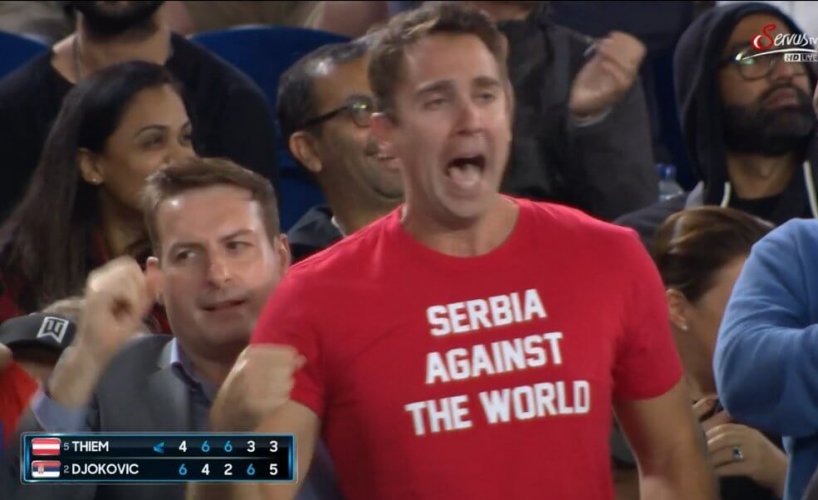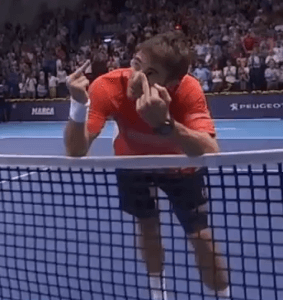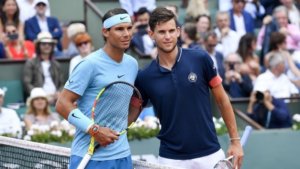(Originally posted on my Facebook page on 2 February, 2020)
It was to be expected that Dominic Thiem will give Novak Djokovic a fair fight in the Australian Open final. The player who defeated three top ten seeded tennis players in a row on his way to the final – Monfils, Nadal, and Zverev – has proven over the past year that he is made of the stuff of champions. In my opinion, this past year Thiem was clearly the third best tennis player in the world. The reason he will only be ranked fourth when the new world rankings are updated on Monday is his premature losses in Wimbledon and the US Open last year.
But nobody expected the kind of final we saw today. A close, physical match – sure. Five sets – why not? Wild inconsistencies in Djokovic’s playing level, however, especially on what has become his home court, in an Australian Open final in which he has never been defeated, were clearly unexpected. Djokovic opened today’s game with a storm, starting at the exact same point where he left off in his perfect final in 2019. We witnessed a little bit of Djokovic clumsiness towards the end of the first set, but the snowball that started growing from that point on could never have been predicted in any crystal ball on the planet. For two entire sets, the real Novak Djokovic, the beast, the best tennis player in the universe and certainly in the Southern Hemisphere, disappeared completely and vanished from the court.
During those sets, Djokovic hit innumerable unforced errors (40 in total during the first three sets combined). He was unable to put any pressure on Thiem, looked defeated, shoulders hunched, as if he knew something we didn’t. Much of this match was shrouded in mystery. Djokovic requested a medical time out during the third set, as well as between the third and fourth sets, but only he and the medical staff know what transpired between them. The spectators at home were left to speculate about the situation.
At the beginning of the fourth set, when Djokovic returned to the court, reemerging from medical treatment he received somewhere in the recesses of the Rod Laver Arena, the game turned around. Djokovic hit with ever-increasing confidence, and after a nice point or a good serve, he nodded to himself as if he were coming to terms with the situation – “things are under my control”, he likely told himself. “This is how things should be.”
Thiem aced two challenging mental tests on his way to the final, but today’s test was different from the other two. Unlike the match with Nadal, today his rival’s intensity and concentration were inconsistent, and that had a clear impact on him. Unlike the game against Zverev, Thiem was competing against a rival who knows (not thinks, hopes or assumes) that he is supposed to win, wants to win, and will do everything it takes in order to win. Thiem’s level of conviction (or his ability to convince himself?), on the other hand, was low. Thiem was hesitant, and the errors started to pile up in the match statistics.
The fifth set was the closest and most suspenseful of the match. Djokovic was the first to get the break. Thiem had opportunities to break back, and then Djokovic had opportunities to break again. Both couldn’t get the breaks on the board. Thiem demonstrated sparks of the capability we were hoping to see from a tennis star such as himself in the fifth set of a Grand Slam final, but those sparks did not light a fire at any stage. From the minute Djokovic got his “mamba mentality” back, even the most avid Austrian fans came to comprehend that the chances of a first Austrian Grand Slam win since the 1990s were growing slimmer.
It’s very hard to defeat Novak Djokovic at the Rod Laver Arena, especially during the semi-final or final of the Australian Open (where he has a record of 0 losses to 16 wins). That is all true. But it seems to me that today we again witnessed not only the difference between Djokovic and the other tennis players on tour, but the exceptional greatness of the top three versus the rest of humankind.
This is the second Grand Slam final in a row where a player born in the 1990s came close to winning a Grand Slam title against one of the generation’s greats. In the end, the string of victories by players born in the 1980s has reached a trillion consecutive Grand Slam titles (the last tennis player born in another decade to win a Grand Slam title was Gastón Gaudio, born in 1978, in the 2004 French Open), and that happened not because of exceptional tennis from Djokovic (and today he was not at his best), but because of a certain type of unnamed node in the brain, which has neither color nor scent, and which has transformed Novak Djokovic, Rafael Nadal and Roger Federer into athletes who warrant superlatives which would seem ridiculous in any other context.
It would be impossible to finish without writing a few words about the future of the Djokovic saga. I estimate that tennis fans around the world can be divided more or less 60% – 35% between Federer fans and Nadal fans (Nadal fans, please forgive me if I am a bit prejudiced towards Federer, but I don’t think I am exaggerating). Serbia may be the only country in the world where Novak Djokovic has more fans than Federer or Nadal. The head photo in this article, in which a fan watching today’s match is wearing a “Serbia against the world” shirt, accurately reflects the situation. Djokovic suffers, it seems, from the greatest discrepancy in the history of sports between his level as an athlete and the small percentage of fans he commands in the sports industry. Even after seven Australian Open titles, fans in Melbourne today treated him like just another tennis player, not favorable to Thiem. Why? Did he do something to deserve it? Is that why he was frowning during the trophy ceremony? And will this disparity be the fuel that drives Djokovic to do what he needs to do in order to continue to scrape away at the historical legacy of his greatest rivals? Time will tell.


